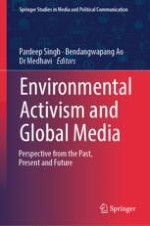2024 | OriginalPaper | Buchkapitel
4. Democracy, Global Climate Change and Raising Environmental Issues
verfasst von : Vimla Singh, Shiv Shankar
Erschienen in: Environmental Activism and Global Media
Verlag: Springer Nature Switzerland
Aktivieren Sie unsere intelligente Suche, um passende Fachinhalte oder Patente zu finden.
Wählen Sie Textabschnitte aus um mit Künstlicher Intelligenz passenden Patente zu finden. powered by
Markieren Sie Textabschnitte, um KI-gestützt weitere passende Inhalte zu finden. powered by
